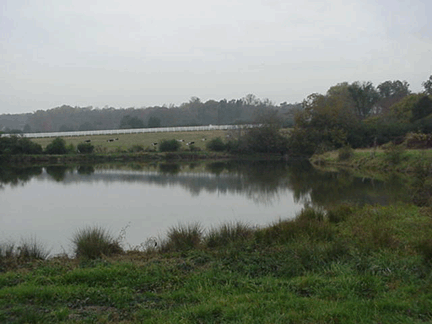 I blog elsewhere about the adventures (and misadventures) of trying my hand with a small hobby farm. Most of the time, the joys and struggles of that life with some land do not intersect in any obvious way with my life and vocation at the Seminary. (Although there are hopeful signs that my worlds might be converging!)
I blog elsewhere about the adventures (and misadventures) of trying my hand with a small hobby farm. Most of the time, the joys and struggles of that life with some land do not intersect in any obvious way with my life and vocation at the Seminary. (Although there are hopeful signs that my worlds might be converging!)
But today (the fortieth anniversary of Earth Day!) brought together for me some disparate threads: my life here in the Concordia Seminary community, my life of worship and listening to the word of God, and my avocation as a wannabe farmer. Chuck Arand led us in worship, and provided an articulate and beautifully biblical exposition of the inner coherence of our faith in God as Creator and our faith in Christ as Savior. I’ll be sure to link to it as soon as it’s up on iTunes. If you’re a Christian, and you want to think about how your faith relates to the environment, you should listen to this sermon! If you were on campus today, you also had an opportunity help plant about 75 trees immediately after chapel. As Chuck said, “Christ is risen, Christ will come again! Let’s go plant some trees!”
 Our vocations as creatures are not generic or abstract. I am not generically a “husband” but the husband of one particular, wonderfully specific woman. I share — with other human creatures — the responsibility to care for God’s whole creation; but more particularly I have been given (in a way which you have not) a specific chunk of land to nurture, to protect, and to use. My Earth Day stewardship is anchored to a specific spot on the map. That concrete specificity brings with it real limits, and we must never mistake stewardship with sovereignty. As I wrote elsewhere:
Our vocations as creatures are not generic or abstract. I am not generically a “husband” but the husband of one particular, wonderfully specific woman. I share — with other human creatures — the responsibility to care for God’s whole creation; but more particularly I have been given (in a way which you have not) a specific chunk of land to nurture, to protect, and to use. My Earth Day stewardship is anchored to a specific spot on the map. That concrete specificity brings with it real limits, and we must never mistake stewardship with sovereignty. As I wrote elsewhere:
To live and work happily with the Farm is a series of adjustments and accommodations, a dance of compromises between our human intentions and the elements we are given to work with. The elemental life of the Farm is a life in which we are not sovereign, not the masters of all we survey. We have to learn to live with only limited control.


Leave a Reply
You must be logged in to post a comment.